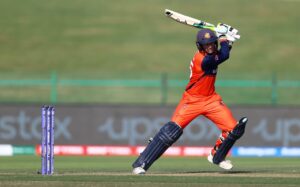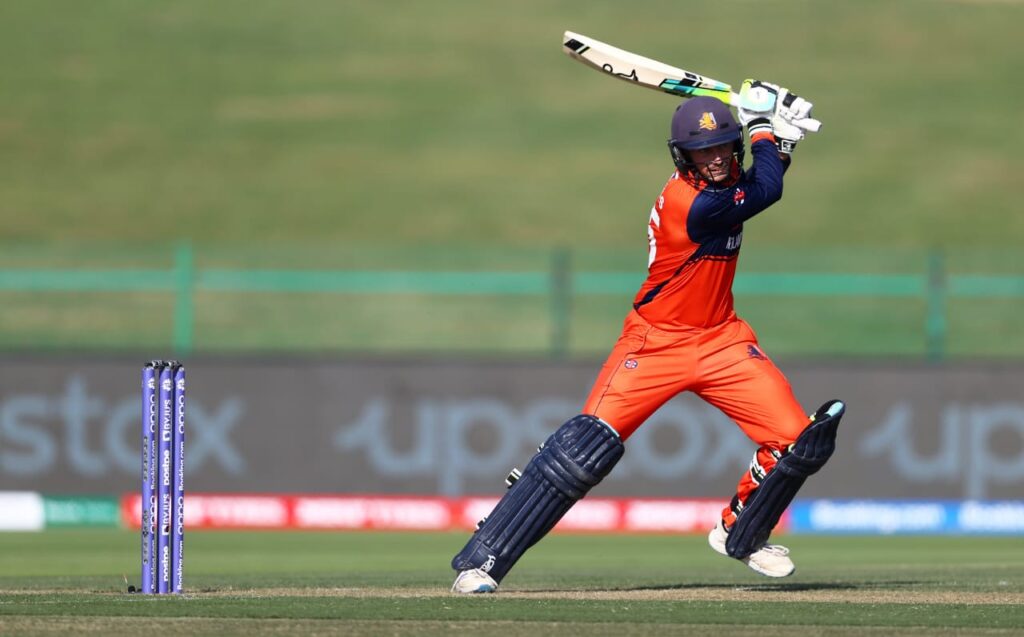
Name the cricketer born on a Pacific Island and brought up in Australia who subsequently captained the Netherlands? Scott Andrew Edwards, the Netherlands skipper, could one day turn out to be a tie-breaker question in a quiz contest.
So, what is the story behind Edwards’ remarkable journey? How did he end up playing for the Netherlands? “Born in Tonga, lived there for the first two years, obviously grew up in Australia, my father’s side (grandmother) was of Dutch origin,” he told RevSportz. “Played for a Dutch club for one year, came back to Australia for a couple of years, got called up by Ryan Campbell, the national coach at that time, to play in a series in the UAE. Ever since then, I have been based in the Netherlands. Six months there, and six months in Australia in the summer, playing cricket.”
Incidentally, Edwards played club cricket for Richmond, Highton and Blackburn South Cricket Club in Australia. But it was his association with Schiedam club Excelsior ’20 in the Netherlands that paved the way for him to earn bigger honours. Campbell, who was then heading the Netherlands coaching staff, kept an eye on Edwards’s performances and he was soon drafted into the national side for the Intercontinental Cup game against Namibia in Dubai. He hasn’t looked back since.
It was last June that Edwards also became the national captain, replacing Pieter Seelaar, who had to give up cricket due to persistent back problems. If anything, Edwards seems to enjoy the triple role of being the mainstay of the batting unit, donning the wicket-keeping gloves and leading the side.
The crowning glory of Edwards’ career so far was spearheading Netherlands’ entry into the 50-over World Cup. The Dutch side were one of the outsiders to qualify for the 50-0ver World Cup in India, and they also lost their opening fixture of the qualifiers to Zimbabwe.
“Obviously, we played some really good cricket,” noted Edwards. “In that opening round, we lost to Zimbabwe. We scored 315, which at that time we thought it was a good score. Turned out that the wickets were a bit better than we thought, so we had to get bigger scores than that. That was a little bit of a wake-up call for us.”
Ultimately, on the back of epochal wins over West Indies and Scotland, the Netherlands secured their place at the mega event. Edwards shares fond memories of how they went about pursuing West Indies’ mammoth total of 374, alongside the never-to-be-forgotten moments during the Super Over, where Logan van Beek smacked Jason Holder for 30 runs. Edwards was the non-striker during that over.
“Right after the first half, Ryan Cook set his whiteboard and had little targets,” he said. “When you break the game down, even if it is a big score, you can simplify through the phases. Of course, you have to bat well to chase a target like that, but the mood in the camp was positive, we were pretty confident. It was nice it worked out that way.
“I probably got the best seat at the other end,” he observed with a smile, recalling the van Beek blitz. “It was pretty special, van Beek was a man on a mission. He said, ‘I want this, I want to bat’. I then asked, ‘I haven’t batted for a while, you want to face the first ball, or you want me to?’ He said, ‘I want to take it’. The rest is history.”
Edwards, who bats at No. 6, is also known as the side’s crisis man. Be it against Afghanistan or Pakistan last year, or his contributions in crunch games against Sri Lanka and West Indies in the World Cup Qualifiers, Edwards has been Netherlands’ bedrock. So, how does he manage scoreboard pressure while chasing down a sizeable target?
“First you think about the conditions, then you alter your game and figure out how to score on different surfaces, different bowlers. So, I suppose that is the first thing that goes through your head. Then playing my way, my style. If you bat well, you get the runs, then chase down the runs, that is the goal. That is just setting yourself up to chase down that target, however many runs per over you have to go at.”
When Edwards first picked up a bat, his initiation didn’t exactly suggest that he could go on to become the lynchpin of a national side. Back in those days, it was more about playing the game for fun. “Playing backyard cricket with my brother (Chris) and my next-door-neighbour,” he said. “After school, pretty much playing for three to four hours until the parents called you for dinner. Those are probably my earliest childhood memories.”
Around two decades later, Edwards is a part of a tournament that he calls “the pinnacle of cricket”. “We don’t play Test cricket,” he adds. “The T20 World Cup was amazing, but the 50-over World Cup is the next level up.”





